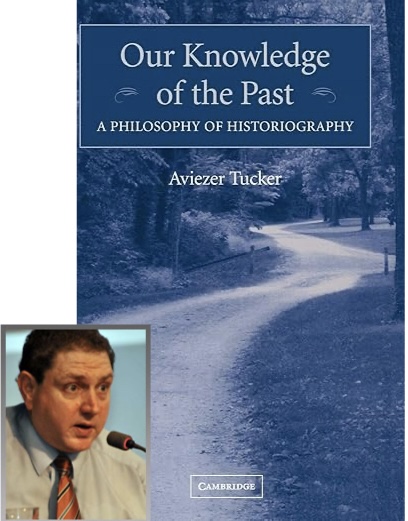 Recent discussions have sent me back to a second look at Aviezer Tucker’s Our Knowledge of the Past. (I posted about this book back in 2013.) A detail I had forgotten in the meantime is Tucker’s interesting explanations about when a consensus is more likely to be trustworthy than not. Here is part of what he writes:
Recent discussions have sent me back to a second look at Aviezer Tucker’s Our Knowledge of the Past. (I posted about this book back in 2013.) A detail I had forgotten in the meantime is Tucker’s interesting explanations about when a consensus is more likely to be trustworthy than not. Here is part of what he writes:
In the real world, there is no universal consensus on beliefs because some people always dissent. There are still people who deny that the earth is round or that it revolves around the sun and others who deny that there was a Holocaust. This led philosophers who consider consensus to be philosophically valuable to attempt to prescribe whose opinions matter for determining whether or not there is a consensus on beliefs. Reliance on professional organizations or academic institutions, affiliations, and certifications is a tempting approach. If all professional astronomers agree that the earth is round and revolves around the sun, it must be because they have knowledge of the heavens and those who honestly dissent must be either ignorant or irrational. At their best, professional and academic institutions should indeed reflect the qualities that make consensus among their members significant as a possible indicator of knowledge. Still, this appeal to authority failed too often in history. Academic and professional institutions have proved themselves to be too susceptible to political threats and manipulation, economic dependence and graft, or the common biases of a class of people who share professional interests and often social background. The corruption of the German academic system under the Nazis, the rejection of relativity in physics, the destruction of psychology, anthropology, and historiography in favor of dark racist fantasies is just the most extreme example of the ever-present temptation of academic and professional institutions, even in previously excellent academic systems, to prefer their institutional, class, and professional interests to intellectual integrity. (33)
So what does Tucker advise given the fact that the consensus of authorities may not always be a reliable guide to the truth of a matter?
The alternative approach I present here does not have to rely on authority, nor does it require universal consensus. It merely requires unique noncoerced heterogeneity: It does not matter if some do not agree to a set of beliefs, as long as the people who do, are sufficiently different from each other to reject alternative hypotheses to the knowledge hypothesis, and those who dissent are sufficiently homogenous to support hypotheses that explain their dissent by particular biases. For example, the group that reached consensus on Darwinian evolution is uniquely heterogeneous, it includes people who are secular and religious, and of many different faiths. The community that upholds the alternative “creationism” is quite homogenous, composed exclusively of biblical fundamentalists, almost all of whom are American Protestants, though many American Protestants believe in Darwinian evolution. Their bias in favor of an anachronistic, historically insensitive interpretation of Genesis is the best explanation of their beliefs. (34)
I know many readers of this blog will be thinking of the consensus on the historicity of Jesus. In the light of the above, we may see a reason certain critics of the Christ myth theory attempt to portray “mythicists” as a singular group of Christian-hating atheists. By ignoring the broad spectrum of “mythicists” — atheists, Buddhists, prominent public intellectuals, and even faithful Christians and others who have expressed a high regard for Christianity — the mythicists are portrayed as a narrow, homogenous group with a unique hatred of Christianity and thus able to be comfortably dismissed.
Tucker says a reliable consensus must be uncoerced and sufficiently large. How large?
The heterogeneous group that reaches consensus must be sufficiently large to avoid accidental results. Small groups can never be sufficiently heterogeneous to exclude hidden biases. . . . If only four scientists work on a particular problem and they agree on a set of related beliefs, it does not imply that their agreement reflects common knowledge. The four may be a professor, her assistant, a former student, and an untenured member of faculty who needs her vote on the tenure committee. The minimal size of a significant consensus depends on local circumstances such as whether the people who develop a consensus are related socially, the nature of their relations, and whether they attempted to replicate the process that generated the beliefs or merely accepted the conclusions of others on faith or authority (Sarkar, 1997, p. 510). Usually, when the consensus involves hundreds of people who are geographically, institutionally, and professionally dispersed, it is safe to assume that it is large enough. If the consensus is on an esoteric topic, and only a handful of experts are competent or interested enough to reach the consensus, they may possess knowledge, but their consensus cannot function as an indicator of knowledge. It is necessary to follow their reasoning to evaluate the status of their beliefs. (34)
Those are three key features for “mere outsiders” to look out for when deciding whether they have a right to hold any reservations about a consensus among the experts:
- The consensus is uncoerced;
- The consensus is found among a “sufficiently large” and heterogenous group;
- Dissenting voices are from a “sufficiently homogenous” group such that their biases are readily apparent.
They look like a neat rule of thumb to me.
Goldman, Alvin I. “Foundations of Social Epistemics.” Synthese 73, no. 1 (October 1987): 109–44. https://doi.org/10.1007/BF00485444.
Tucker, Aviezer. Our Knowledge of the Past: A Philosophy of Historiography. Cambridge University Press, 2009.
